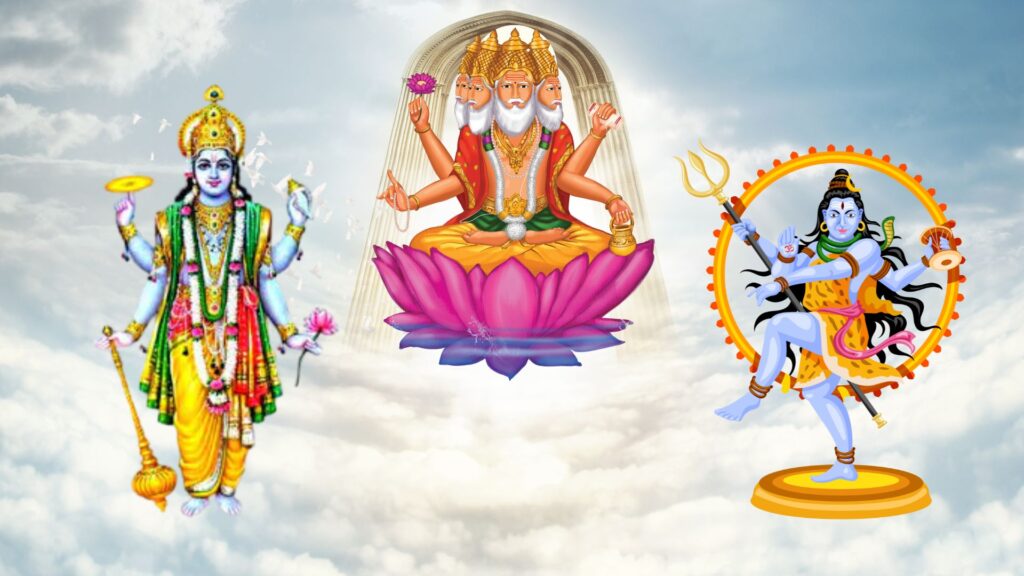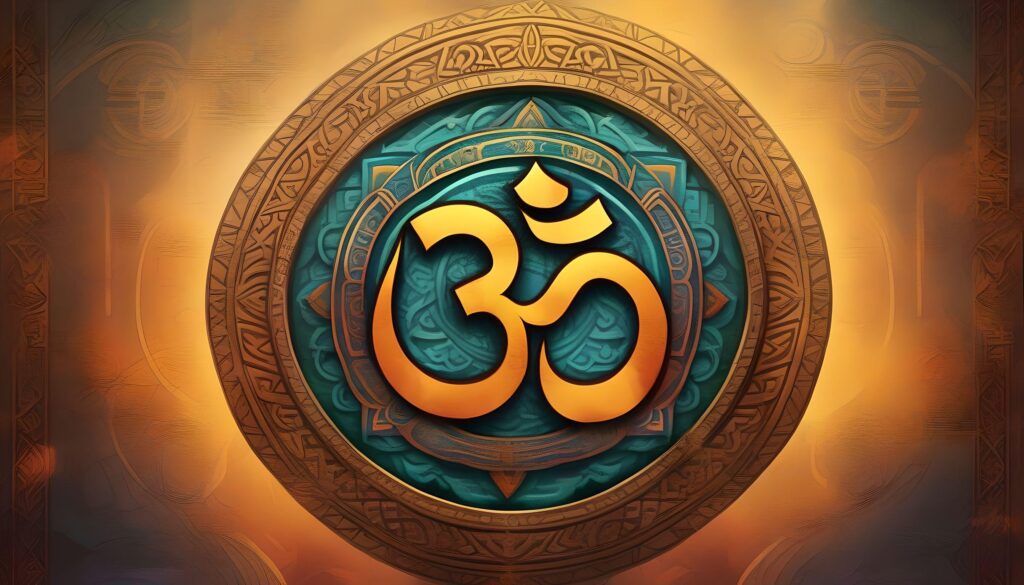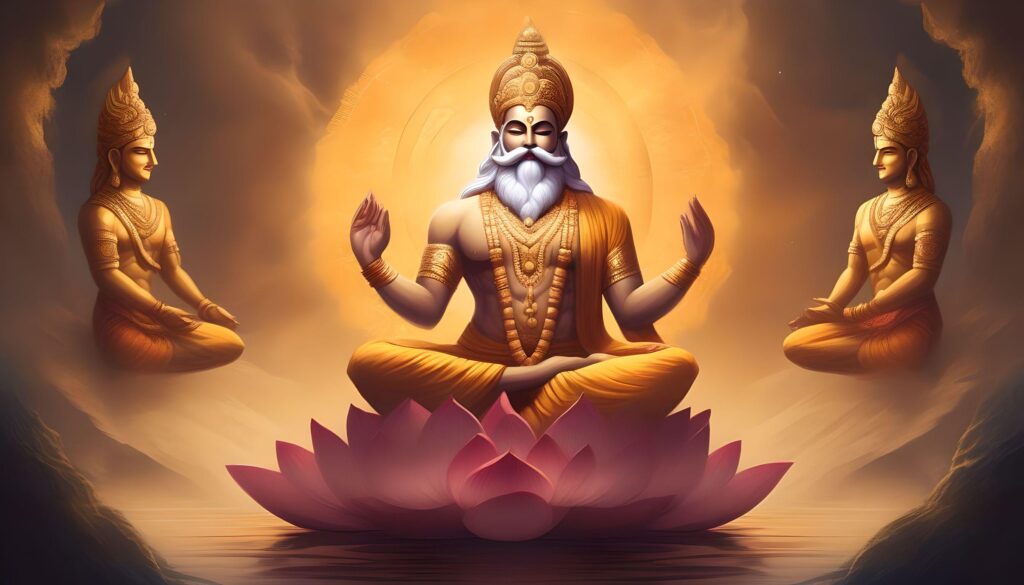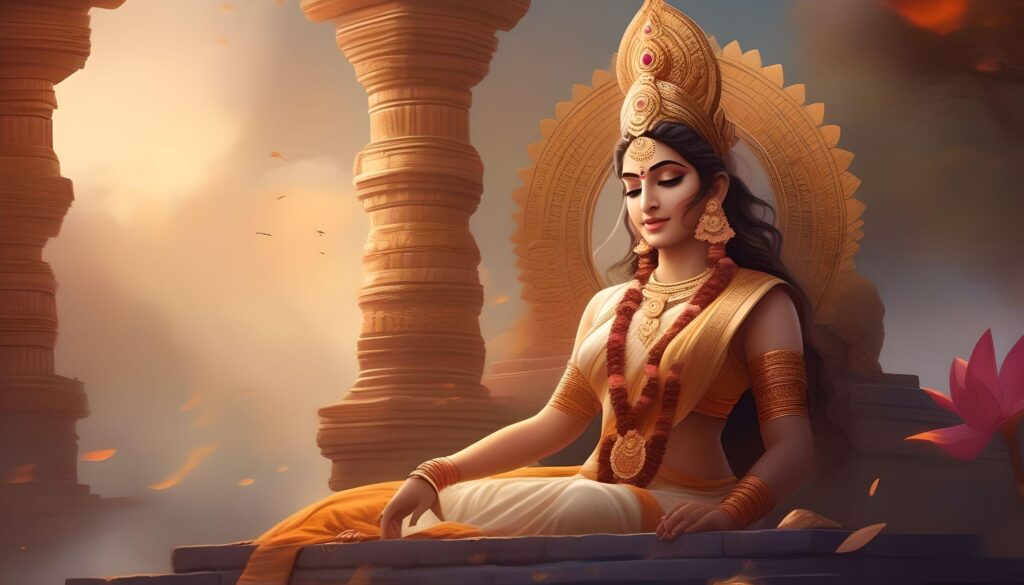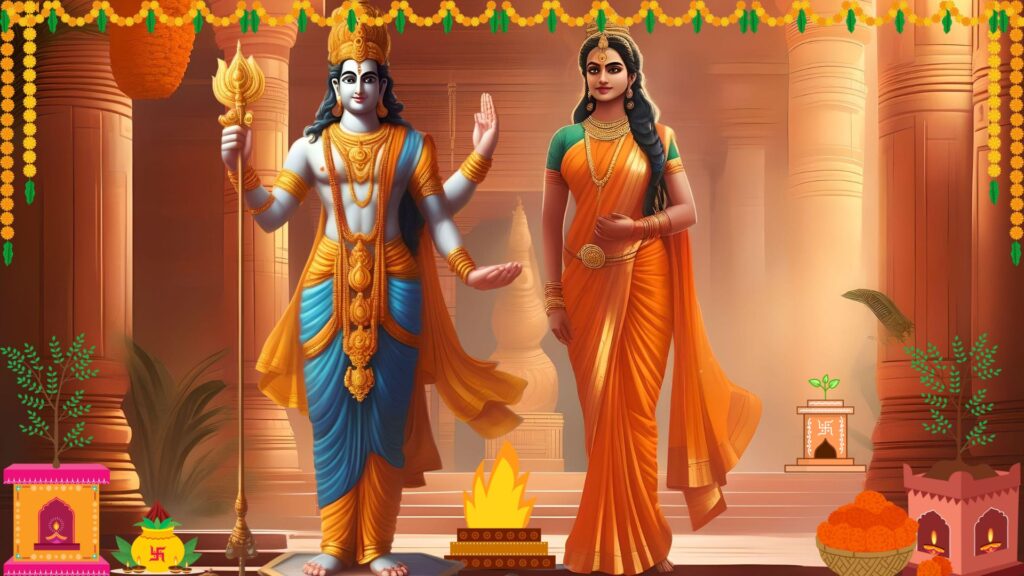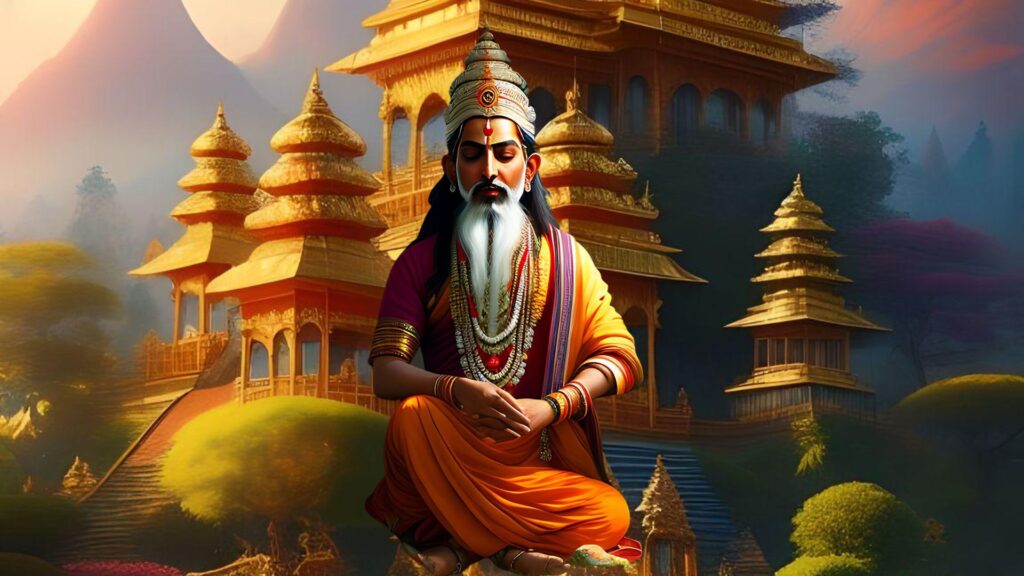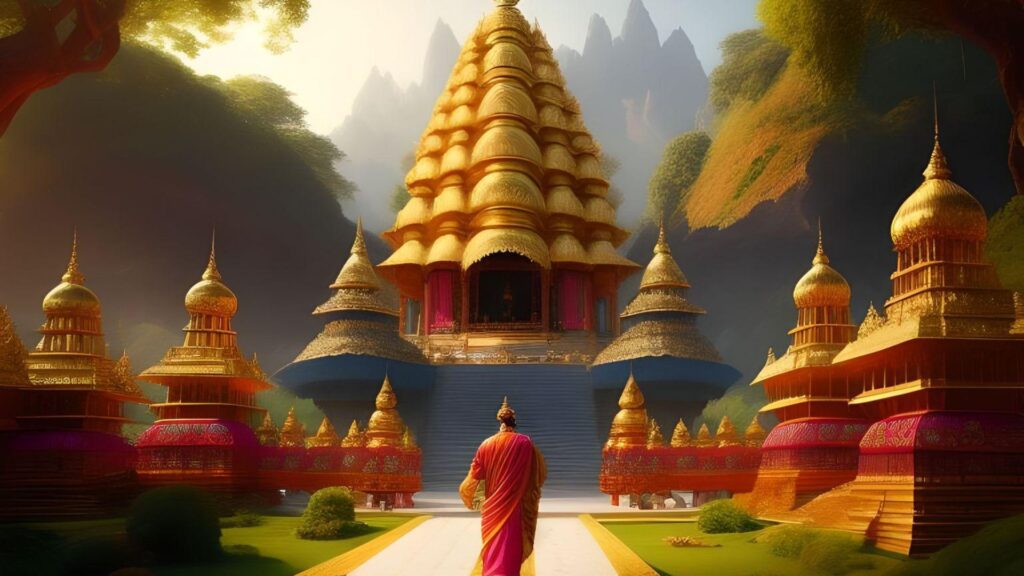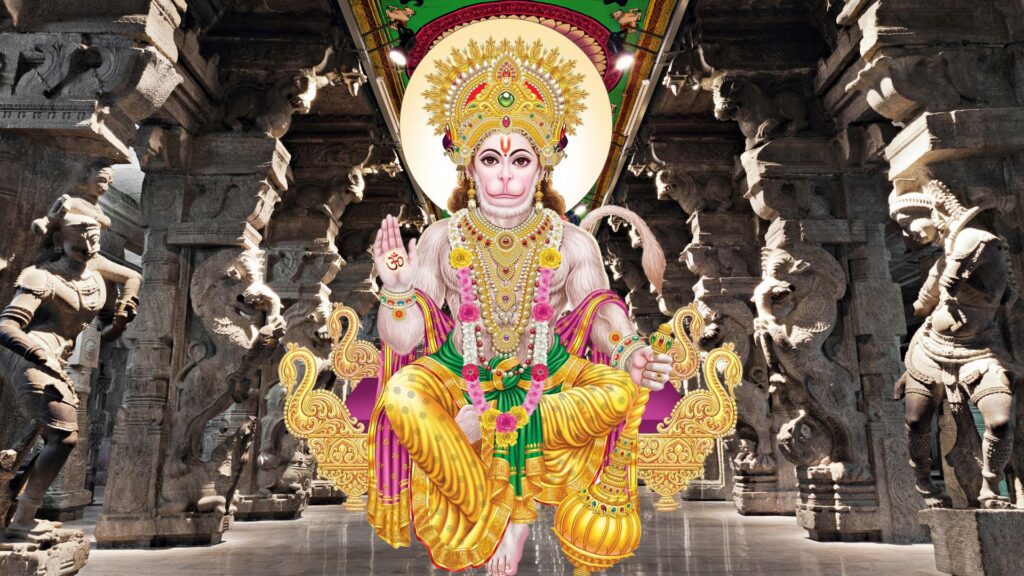Life Lessons from Hindu Deities:
Lord Shiva, Lord Vishnu, and Lord Brahma (5 Points)
Hinduism, the most ancient religion still observed today, presents a diverse array of doctrines and rituals that have developed and refined throughout millennia. Three principal deities known as the Trimurti—Brahma, Vishnu, and Shiva—are fundamental to Hinduism. These celestial entities symbolize distinct facets of the supreme reality, Brahman, and impart guidance to mortals as they traverse the perpetual processes of formation, upkeep, and annihilation. By delving into the narratives and teachings associated with these celestial beings, one can reveal profound insights that can motivate and enhance one’s personal journey.
Brahma: The Creator
As the deity of creation, Brahma represents the origin of all wisdom and knowledge. Brahma, as portrayed in Hindu mythology, is an aubergine male figure adorned with four features, each symbolizing a distinct facet of the four revered Vedas—namely, the Rigveda, Yajurveda, Samaveda, and Atharvaveda. The Vedas comprise the guiding principles and teachings of Hinduism.
1. The Importance of Knowledge and Wisdom
The correlation between Brahma and knowledge underscores the significance of intellectual development and comprehension. By striving for wisdom, one may endeavor to increase their knowledge, investigate alternative viewpoints, and pursue the truth. By adopting a perspective of continuous learning, one can augment their personal and spiritual growth.
2. Self-Reflection and Self-Awareness
The four Vedas are represented by the four features of Brahma, which also symbolize the quest for self-awareness. They serve as a reminder of the significance of self-reflection and introspection. We can gain insight into our genuine desires, weaknesses, and areas of strength by devoting time to a more profound self-understanding. Self-awareness empowers individuals to consciously determine their courses of action and ensure that they are in accordance with their genuine selves.
3. Embracing Creativity and Innovation
Brahma, being the progenitor of the universe, personifies the potency of ingenuity and advancement. His role motivates individuals to access their own creative capabilities and adopt an innovative approach to life. By fostering our creative capacities, we can generate novel concepts, resolutions, and artistic manifestations that positively impact both our own well-being and that of our global community.
4. Embracing a Dharmic Life
A strong emphasis is placed on dharma, the path to virtuous living and moral law, in Hinduism. Living a virtuous existence and fulfilling one’s moral obligations constitute dharma. Beneficial karma, which is the consequence of one’s conduct and actions, is amassed by means of dharma practice. Through adherence to dharma, one can foster benevolent karma and purify the mind, ultimately progressing to moksha—a state of enlightenment and freedom from the recurring pattern of rebirth.
Vishnu: The Preserver
As the deity associated with preservation, Vishnu safeguards the universe. Vishnu, frequently portrayed with four limbs, a human body, and blue skin, is revered for his purported ability to restore harmony and equilibrium during periods of anarchy and disarray.
1. The Power of Preservation
The lesson we learn from Vishnu’s role as the preserver is the significance of sustaining balance in our lives. Similar to how Vishnu endeavors to protect the cosmos, so too must we seek to preserve balance in our thoughts, deeds, and interpersonal connections. Through the adoption of moderation, compassion, and empathy, one can actively participate in the promotion of a harmonious and tranquil coexistence.
2. Upholding Moral Principles
A fundamental tenet of Vishnu relates to the significance attributed to the observance of moral principles and the lead a righteous existence. Hindu mythology frequently portrays Vishnu as the epitome of virtuousness and justice. Alternating personas, he endeavors to reestablish equilibrium and counter malevolent entities. This situation serves as a poignant reminder to advocate for moral principles and conduct ourselves in accordance with our personal values.
3. Embracing Compassion and Kindness
Additionally, Vishnu is renowned for his benevolence and compassion toward all living things. He serves as a model of how one ought to treat others: with compassion and regard. We can positively impact the world by demonstrating benevolence and compassion in our interpersonal exchanges, thereby fostering greater harmony and inclusivity.
4. Adapting to Change
The progeny of Vishnu, including Lord Krishna and Lord Rama, exemplify the capacity to flexibly respond to evolving conditions. They adeptly maneuver through a multitude of challenges and obstacles with astuteness and elegance. This underscores the significance of developing resilience and adaptability when confronted with challenges. We can persist in our development and progress by embracing novelty and adjusting to changing circumstances.
5. Embodying Devotion and Service
Numerous of Vishnu’s avatars, such as Lord Rama and Lord Krishna, are revered for their embodiments of devotion and altruistic service. These avatars impart the importance of selflessness and altruism by demonstrating the values of devotion to a greater purpose and altruistic service to others. We are able to positively influence the lives of those around us by fostering an attitude of altruism and compassion.
Shiva: The Destroyer
Shiva, the god of destruction, holds the responsibility of ending the cycle of creation and destruction. Shiva’s role is multifaceted, representing both the destructive and transformative aspects of life.
1. Embracing Change and Transformation
Shiva’s association with devastation serves as a poignant reminder of the transient nature of all things and the inevitability of change. Through the process of embracing change and relinquishing attachments, individuals can more effortlessly and flexibly navigate the transitions of life. Shiva teaches us that in many cases, growth and new beginnings require devastation.
2. Embracing Change and Letting Go
An essential tenet espoused by Shiva is the transcendence of attachments and the acceptance of change. Frequently, Shiva is portrayed in Hindu mythology as a deity who obliterates the previous in order to establish the new. This represents the temporal essence of existence and the imperative to relinquish that which is no longer beneficial. Through the process of embracing change and relinquishing attachments, individuals can liberate themselves from the shackles of the past and gain access to novel opportunities.
3. Finding Balance in Opposites
Shiva is frequently portrayed as a divine figure who personifies irrational attributes. He is both nurturing and destructive, fierce and compassionate. This duality underscores the significance of attaining personal equilibrium. Similar to how Shiva skillfully manages the clash of opposing forces, it is incumbent upon us to endeavor to establish harmony among various facets of our existence. Achieving inner calm and a sense of wholeness requires accepting both our light and shadow selves.
4. Cultivating Inner Stillness
A further valuable lesson that Shiva imparts is the significance of developing inner serenity. Shiva is frequently portrayed in a profound state of meditation, which symbolizes the potency of solitude and self-reflection. In our contemporary, fast-paced world, it can be difficult to discover moments of silence and stillness. Nevertheless, in the midst of life’s chaos, we can attain clarity and establish a connection with our interior selves through meditation and self-reflection.
5. Harnessing Inner Strength and Resilience
By virtue of Shiva’s depiction as a formidable and ferocious deity, we are inspired to access our inner fortitude and strength. We can derive motivation from Shiva’s resolute determination and fortitude when confronted with obstacles and difficulties. Through the development of psychological and emotional resilience, it is possible to surmount challenges and emerge more robust than before.
Conclusion: Integrating the Wisdom into Our Lives
The narratives and teachings pertaining to Shiva, Vishnu, and Brahma impart practical wisdom and insights that are applicable to our individual existence. From Shiva, we learn the importance of embracing change, finding balance, and cultivating inner stillness. Vishnu imparts the values of ethical conduct, compassion, and flexibility. Through Brahma, we learn the importance of knowledge and wisdom, as well as the pursuit of a virtuous life guided by dharma. By applying these principles to our daily lives, we can effectively navigate obstacles, foster individual development, and make a positive contribution towards a more harmonious and enlightened global community.
“The essence of Hinduism is not in its external forms, but in the inner spirit which transcends all external rituals and practices.”
– Swami Vivekananda
@srichants #srichants #hinduism #hindugods #lordshiva #lordvishnu #lordbrahma #lifelessons
